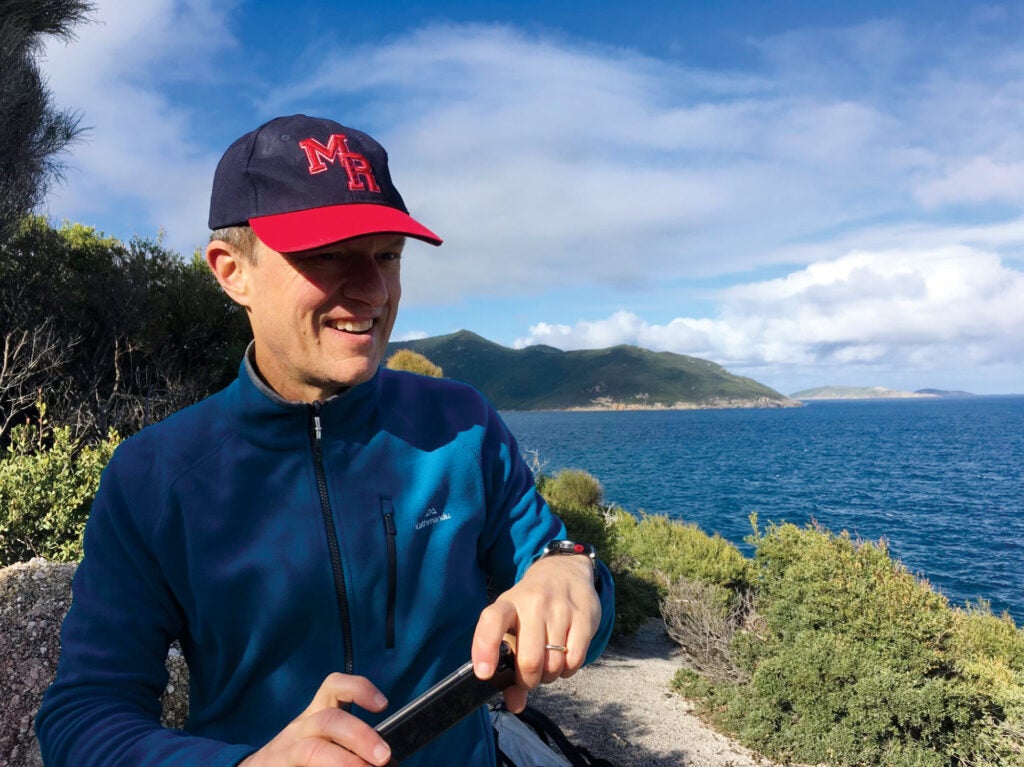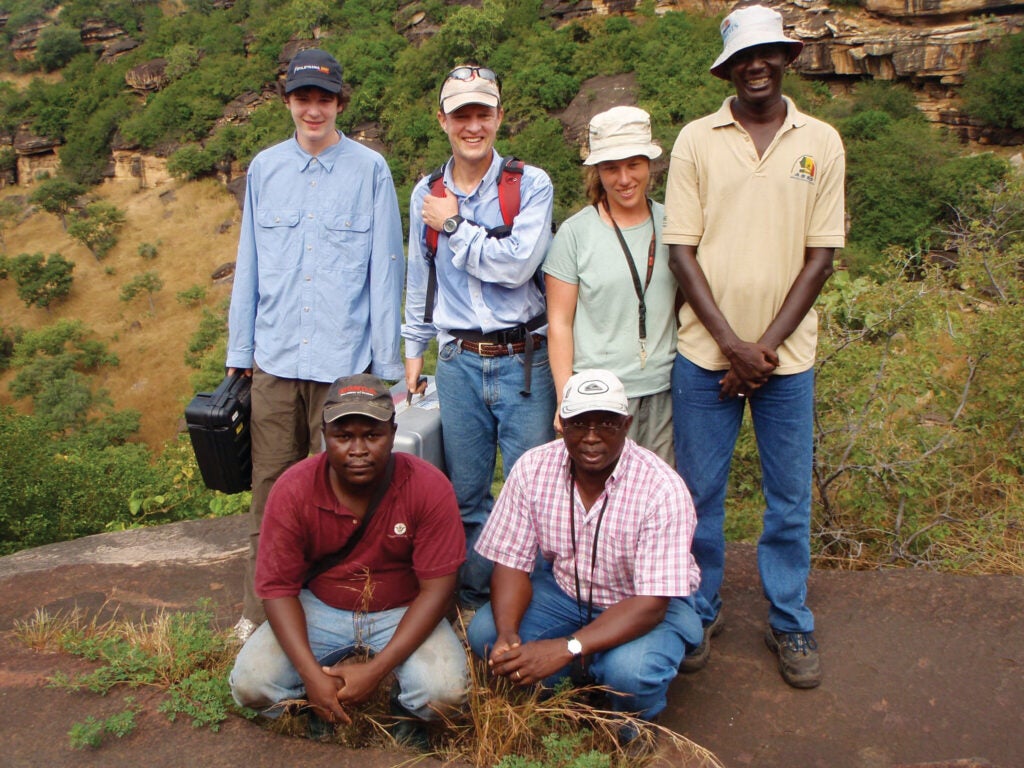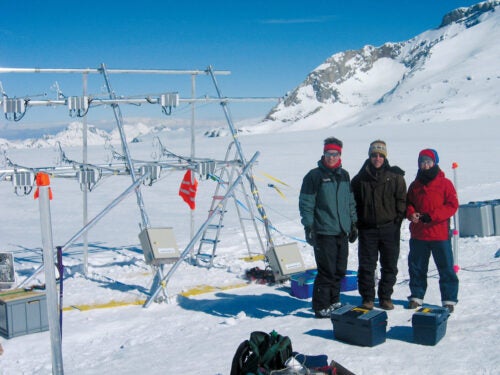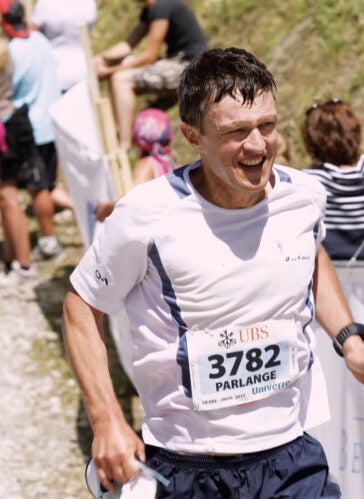Incoming URI President Marc Parlange has spent his life working, exploring, and learning in every corner of the world. Born in Rhode Island, he’s returning as URI’s 12th president, with plans to challenge the state’s brightest minds to tackle the world’s biggest problems.
By Michael Blanding
As chair of the Department of Geography and Environmental Engineering at Johns Hopkins University in the early 2000s, Marc Parlange joined a project to find sources of pollutants causing health issues in Baltimore. “Young people were having asthma and breathing problems, and I was really trying to understand the air quality and air movement around the city,” he remembers about the massive effort sponsored by the Environmental Protection Agency. Getting to the bottom of such a complex issue, he discovered, required many different types of experts, all working together. “You needed community leaders, environmental chemists, transportation engineers, and people like me—people working on the atmosphere,” he says.
Parlange learned something else from the experience: The best collaborators on the project were both generous in sharing their own information, and open to hearing and learning from the experiences of others. “What I found is that good researchers really take the time to explain things to you, but at the same time, appreciate what you bring to the table,” he says. After five years of work, the group produced a report that identified sources of specific fine particles in the air, including breathable dust with various toxins, along with detailed explanations for where they were coming from—vital information that could be used by government officials to prioritize cleanup efforts and dramatically improve child health.

The project was Parlange’s first experience with the amplifying power of a truly multidisciplinary effort in tackling a big, seemingly intractable challenge—and he never forgot it. “The thing I really love about universities is that they are places of depth in many different fields,” he says. “There are good people willing to roll up their sleeves, get together, and work on these tough problems.” He has carried that lesson with him on an impressive university leadership career that’s taken him all over the world—to Switzerland, British Columbia, and, most recently, Monash University in Melbourne, Australia, where he served as provost for the past four years.
This summer, he brings his experience and passion to Rhode Island, where he will become URI’s new president. Parlange hopes to harness the University’s depth of knowledge to tackle some big issues. “Rhode Island is a global leader in ocean and marine sciences,” he says, acknowledging URI’s existing partnerships in Indonesia. “But there are opportunities, for example, to partner with others in Australia and Southeast Asia—to build deeper networks of excellence that can deal with big challenges in fisheries, climate change, wind energy, and so forth,” he says, speaking over a Zoom link from Australia before his move to Rhode Island. “You can do so much more if you have good friends in other countries.”
Parlange hopes to harness the University’s depth of knowledge to tackle big issues.
In the course of an hourlong conversation, Parlange ticks off areas in which URI could make an impact. “Rhode Island is rightly focused on oceanography, business, science, and arts, but there are a lot of topical areas where the University could work across fields on top problems. How are we going to genuinely transform to a clean energy system? That is going to have technical problems, it’s going to have social problems, it’s going to have behavioral work,” he says. “What are our cities going to look like in the future? What are our rural areas going to look like in the future? We’re going to do some bold things.”
As someone who has worked all over the world, he’s excited to return to Rhode Island, where he was born, and which, he believes, has a global perspective that suits his personality. “As a state of immigrants, it’s very welcoming of new ideas,” he says. By using his ability to connect people across disciplines—and to connect Rhode Island to other institutions around the world—he aims to amplify those ideas, making URI even more attractive as a destination school for top students and faculty. “Dr. Parlange’s global vision was developed during a lifetime of traveling the world and experiencing other cultures,” says Margo Cook ’86, chair of URI’s Board of Trustees. “He is someone who can expand the University’s global impact, as well as strengthen its commitment as a partner in the vitality and economic development of the state.”
A Global Career
Among the immigrants who’ve made Rhode Island home were Parlange’s parents. In the 1950s, his father came to Rhode Island from France to study aerospace engineering at Brown University, while his mother came from Ireland to study at Bryant College (now Bryant University). “I can tell you exactly where they met in Providence—the corner of Power and Gano streets,” says Parlange, whose great-aunt and great-uncle owned a triple-decker there, which they rented out to students. “They lived on different floors in the same house.” When they married, they moved to France, where his father completed his Air Force service, and then to Connecticut, where Parlange grew up. Later, his parents relocated to Australia, where Parlange attended high school and university in Brisbane near the country’s rugged Gold Coast. He developed a lifelong love of athletics. “I surfed in Queensland,” he says of the famous home for world-class surfers. “That intimidates people—until they see me surf,” he laughs.

Following in the footsteps of his engineer father, Parlange focused his scientific efforts on water—studying the relationship of turbulence and fluid mechanics to climate and agriculture. The field provided what was, for him, the perfect blend between scientific know-how and social impact. “Water is so basic to life,” he says. “Environmental engineers have arguably saved more lives than all the medical professions put together. However, some one million people still die every year because of lack of access to clean drinking water.”
He returned to the United States for graduate school at Cornell University. Both his master’s advisor, Tammo Steenhuis, from the Netherlands, and his Ph.D. advisor, Wilfried Brutsaert, who is Belgian, had built decidedly global research teams. “Dr. Brutsaert had students from Japan, South America, and Africa,” Parlange says. “He instilled in me the idea of being open to new ideas and approaches from students of all different backgrounds.”
“University leaders need to have been academics, need to have been teaching and advising students and seeing those students succeed. That empathetic part of a leader is important.”
—Marc Parlange
Parlange began his teaching career in 1990 at the University of California, Davis, before moving on to Johns Hopkins University in 1996. There, he was inspired by legendary dean of engineering Gordon “Reds” Wolman, whose father, Abel Wolman, developed the chlorination method that still ensures clean water in the United States. His son was equally passionate about using science for public good. “He was somebody who really believed that universities should interface with government and industry,” Parlange says. At the same time, he says, Wolman lived by the maxim, “If something is worth doing, it’s worth doing badly.” In other words, don’t be afraid to fail. “It means, let’s not wait until things are perfect,” says Parlange. “Let’s start with the resources we have.”
As department chair, Parlange found he, too, had a flair for leadership—bucking an institutional habit of holding meetings in conference rooms, and instead opening up his academic office as a place where students and assistant professors could come for guidance and connection. “It made me realize how University leadership is [important] in creating and cultivating an open environment,” he says. During his tenure, Johns Hopkins launched a new major in environmental engineering, which became one of the top 10 programs in the country, according to the prestigious U.S. News and World Report rankings. “I’ve always enjoyed helping people motivate themselves, and supporting them to reach their potential,” he says. “It sounds trite, but people want to be part of successful teams.”

Parlange’s work caught the attention of Patrick Aebischer, a Swiss professor who worked at Brown University in the 1990s, and later served as president of the École Polytechnique Fédérale de Lausanne (EPFL), one of Switzerland’s two flagship technical universities. Aebischer was creating a new institute for environmental engineering and recruited Parlange as director in 2004. Aebischer had grand plans for the university, reenvisioning it as a global hub of innovation between academia and industry—years before such ideas became mainstream. “Now every single university around the world is talking about it, but Aebischer did this 20 years ago,” Parlange says. “He wasn’t building a technology park, he was building a vibrant oasis for ideas and translational research, one that would have the highest expectations for quality research, at the same time being strongly society-facing.”
Aebischer’s vision became reality, as he undertook a root-and-branch reform of how university departments communicated and opened up new lines of communication with government to work across the French- and German-speaking sides of the country. EPFL is now known as one of the world’s top research universities, and a case study in how to do university transformation right. “I found it quite inspiring that could happen to an institution—that you don’t have to stay locked in a certain position, but that you could get stronger,” Parlange says. “How many people heard of EPFL 25 years ago? People often mispronounced it and got the letters mixed up. Now it’s a clear global leader.”
An Inclusive Attitude
Parlange took those lessons to heart in his next position as dean of the faculty of applied science at the University of British Columbia, starting in 2013. There he led efforts to open two new innovation hubs, combining technology and entrepreneurship—now essential for any research university. At UBC, he also continued his own research, including a project in Burkina Faso that examined the effects of climate change and farming practices on the agriculture of West Africa—a topic for which he is now internationally known.
“With the Applied Science School of Community and Regional Planning, we established, together with the Musqueam First Nation community, the first master’s program in Indigenous community planning. The graduates are in very high demand throughout British Columbia,” he says, adding that he is excited to see similar conversations happening with First Nations communities in Rhode Island. He notes the recently announced plans for the relocation of Rhode Island’s Tomaquag Museum—dedicated to educating the public about the history and culture of Rhode Island’s Indigenous people—to URI land near the Kingston Campus.

Parlange continued his global focus as provost and senior vice president at Monash University, Australia’s largest research university, starting in 2017. Based in Melbourne, Monash sprawls throughout the Pacific and Indian oceans, with campuses in Malaysia, China, Italy, and India, where graduate students split their time while conducting an international research project as part of a joint Ph.D. program with the top-ranked Indian Institute of Technology Bombay. Having that kind of global reach is the only way that an institution can truly work on problems of climate change or international security that affect the entire world, argues Parlange, who hopes to expand similar global relationships at URI. “These are the deep, deep partnerships we could build,” he says.
At Monash, Parlange helped to spur some ambitious projects in areas such as antimicrobial resistance, AI and data science, new-generation building construction approaches, and better governance and policy. A new research endeavor in sustainability will examine the effects of climate change in Antarctica, some 2,000 miles across the Southern Ocean. The project involves multiple departments at the university, as well as a dozen other Australian universities and government agencies.
This past year, Parlange led another effort called the Melbourne Experiment, which examined all aspects of the city during the coronavirus pandemic, from air quality to the livelihood of street musicians. “We wanted to monitor and understand what happens when you shut down a city for an extended period of time,” says Parlange, who hosted up to 200 people every Friday for a Zoom meeting featuring speakers and discussion on the topic.
“We had Ph.D. students and undergraduates, faculty, deans, professional staff, alumni, government, industry,” he says. For more than a year, the sessions became a launching point for numerous research projects, including a study on the livability of the suburbs, an examination of racism toward Indigenous people, and a collaboration between public health, arts, and law faculty on domestic violence. Ironically, Parlange says, the venture became a way to deeply connect faculty members who had never met each other on campus, and pool knowledge and resources to examine issues that could have a long-term impact on urban planning and global sustainability goals. “It goes back to what I learned in Baltimore about respect, openness, sharing, and generosity,” Parlange says.
An Expansive Vision
Members of the URI presidential search committee were enthusiastic about Parlange’s wide-ranging talents. “He is an accomplished, visionary leader who has focused on student success and experience,” said committee chair and URI trustee Thomas M. Ryan ’75, Hon. ’99. “We found a champion for all faculty, staff, and students—a president who can lead the University toward another transformational decade.”
When he arrives in Kingston this summer, Parlange is hoping to build on URI’s initiatives to connect people across disciplines. He cites URI’s Signature International Programs, in which students embed themselves in language study while pursuing a dual major in another field—engineering and German, for example. Or computer science and Chinese, or fashion design and Italian. URI’s International Engineering Program, the first of URI’s Signature International Programs, was groundbreaking and has long served as a model for other institutions in the United States. “It was a bold initiative that was really followed through, and that is extremely important,” he says.
He believes that his longtime experience as both a professor and an administrator will help him make connections with faculty and students to push through similarly bold initiatives. “I know what it is to get up at 4 o’clock in the morning to refresh what I’m going to say in an 8 o’clock lecture, or what it’s like to have worked for weeks on a proposal and be told there’s not enough money, so you’re not funded this year,” he says. “I think university leaders need to have been academics, need to have been teaching and advising students and seeing those students succeed. That empathetic part of a leader is important.”
He’s also looking forward to becoming part of the campus community. An avid sports enthusiast, he and his wife recently became fans of the St. Kilda Football Club (Saints), a Melbourne-based Australian-rules football team. “We are in a city where that’s their unbelievable passion, and I’ve joined the Saints club,” he says, holding up a St. Kilda cellphone case. “It’s an incredible sport—it’s just creative chaos.” He’s eager now to cheer on the relatively more orderly—but no less exciting—URI basketball teams—particularly the women’s team, where six of the 12 players on the roster last year and the associate head coach are French. “I’m excited to meet them—and to wear a shirt that says URI Basketball,” he says.
Parlange also plans to stay active at URI through biking, hiking, trail running, and sea kayaking. One habit he’ll have to give up is running five miles back and forth between his home and his office at Monash each day—since the president’s house at URI is right in the middle of campus. “I tell everybody that I will live 100 meters from my office, so I now can run in the daylight with students, staff, and faculty,” enthuses Parlange, who wouldn’t have it any other way. Being at the center of the action, connecting the people around him, and helping spur them to achieve big plans, is exactly where he likes to be. “Every morning, I’ve been receiving the most fantastic emails from people at URI—with ideas, with energy, with enthusiasm—and they are ready to teach me about what they are doing,” he beams. “I hope those emails never stop.” •
PHOTOS: COURTESY MARC AND MARY PARLANGE

Great!
As a URI Alum, I am excited to see the appointment of Dr. Marc Parlange to be the next President. With his enormous Academic Experience from around the world and with his formal training in Environmental Engineering, Dr. Paralenge will lead URI to become a successful world-class cutting-edge university.
Dr. Parlange,
On behalf of the URI OLLI (Osher Lifelong Learning Institute), I want to welcome you back to Rhode Island and to the URI. We are looking forward to working with you to grow the URI and the OLLI program.
Jet Vertz
OLLI Member and Instructor